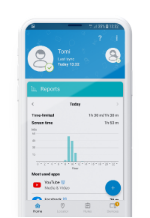Is my child being groomed? And what to do next
It is a horrible situation to find yourself in as a parent, finding out that your child has been attacked by an online predator, manipulated, and taken advantage of.
The mother – who asked to remain anonymous – was browsing through her 15-year-old daughter’s Facebook page when she came across a message from an adult man she didn’t know. Her suspicions about the man were confirmed when she texted, pretending to be her daughter.
The man replied immediately, and the content of their chat rapidly became more sexual. Luckily, the man gave away some details about himself during the conversation.
Armed with this information the mother launched an online investigation of her own and, after some digging, found what she was looking for. Dennis Williams, the man on the other side of the chat was using his real name and was actually a 33-year-old convicted sex offender.
Identifying this individual would not have been possible had the mother been unaware of the risks online or not monitored her child’s activity on social networks. But the latter, in particular, can be very time consuming. Using parental control tools can make it easier and more effective, by automatically alerting parents to irregularities.
With the help of this modern and increasingly widespread technology, you can also get a feel for what your youngsters are up to when they surf the web, to whom they talk, and how much time they spend online.
In this case, after uncovering the man’s background, the tech-savvy mom immediately contacted local police. Investigators continued the conversations she had begun, eventually receiving naked photos of the offender and arranging a meeting in the name of the child.
When Williams showed up, he was handcuffed and later jailed without bail. The police commended the mother for doing a great parenting job.
“They [the mother and daughter] have a good enough relationship where the mom was monitoring her child’s internet activities, and in this case, it prevented what could have possibly been a very bad decision on her part as well as a criminal act on his,” said Colonie Police Lt. Robert Winn for ABC10 News, which reported the story.
Having a good relationship with your children and some basic knowledge about technology are excellent foundations for helping them use the internet safely. Below are some age-specific measures you can take:
Kids up to 11 years old:
From 11 to 13 years old kids shouldn’t have to share their passwords but parents should:


With ESET Parental Control for Android
TRY FREE FOR 30 DAYSIt is a horrible situation to find yourself in as a parent, finding out that your child has been attacked by an online predator, manipulated, and taken advantage of.
Social media, chat rooms, instant messaging, and online games: all of these offer amazing opportunities for your kids. They can talk to their friends and have fun sharing videos and playing games. At the same time, though, they make it very easy for anyone to contact your child, be it through a message, a comment under a video, or through a game.
What do you see when you see a message from an online predator? Can children recognize it for what it is if or when they see it? And how should they react? Get to know some of the common techniques employed by online groomers and discuss the warning signs and appropriate reactions with your child. Use this article as a tool for prevention and work together with your child to ensure they have safe experiences online.